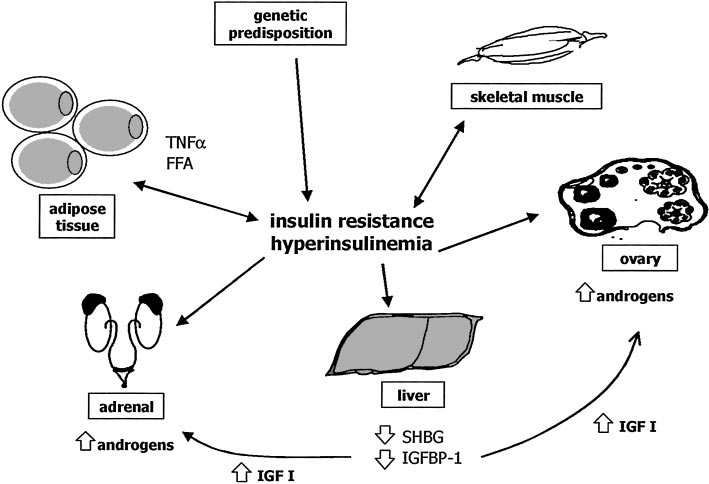
People with PCOS have a higher risk of developing certain diseases in particular, cardiometabolic disease such as hypertension, lipid profile issues (e.g. hypercholesterolemia), metabolic syndrome, diabetes, and coronary artery disease.
Why does PCOS increase my risk for these diseases?
The hormonal dysregulation seen in PCOS seems to predispose people to developing cardiometabolic issues. The biggest issues concerning cardiometabolic issues seem to be stemming from the development of high androgen levels, insulin resistance, and chronic inflammation.

- High androgen levels → Hyperinsulinemia → Development of insulin resistance (also seen in diabetes)
- Insulin resistance → Drives up high androgen levels
- Insulin resistance → Alters lipid metabolism (cholesterol issues)
- Insulin resistance → Drives up low-grade (chronic) inflammation
PCOS = Complex hormone issues
PCOS is ultimately a very common AND complex hormone and metabolic issue. It is a metabolic syndrome that affects many different body systems that can consequently be an underlying factor for the development of other chronic diseases including heart disease.
Does this mean I will have heart disease and diabetes!?
NO, not at all.
Correlation does NOT imply causation.
People who are provided education, resources, and non-judgmental support for navigating their health concerns (not just for people with PCOS) are more likely to have more favorable and more sustainable health outcomes.
That means less period issues, improved cardiometabolic profile, better relationships with food, improved quality of life, so many possibilities! Heart disease and diabetes do not have to be your fate if you have PCOS.
Food for thought
Can you imagine the impact of education, resources, and non-judgmental support on the lives of so many people?
It is no coincidence that nutrition knowledge, food security, health care accessibility, socioeconomic status, social safety, and addressing medical bias and discrimination, have such profound influences on not just our own health but also our community’s.
What can I do to reduce my risk of developing heart disease?
Here’s my succinct recommendation: TWEAK, SEEK, SPEAK.
- TWEAK: Understand what you can do to optimize your nourishment and lifestyle. TIP: Adequate daily protein intake, resistance training, and vitamin D3 are incredible for PCOS management!
- SEEK: Reach out to health care providers and other supportive people to help you simplify matters relating to PCOS and working around it so you can thrive.
- SPEAK: Know that you never have to settle for feeling less than your best. Advocate for yourself (and others, if it resonates with you) especially when it comes to health screens and treatments.
References
- Berni, T. R., Morgan, C. L., & Rees, D. A. (2021). Women With Polycystic Ovary Syndrome Have an Increased Risk of Major Cardiovascular Events: a Population Study. The Journal of clinical endocrinology and metabolism, 106(9), e3369–e3380. https://doi.org/10.1210/clinem/dgab392
- De Leo, V., la Marca, A., & Petraglia, F. (2003). Insulin-lowering agents in the management of polycystic ovary syndrome. Endocrine reviews, 24(5), 633–667. https://doi.org/10.1210/er.2002-0015
- Osibogun, O., Ogunmoroti, O., & Michos, E. D. (2020). Polycystic ovary syndrome and cardiometabolic risk: Opportunities for cardiovascular disease prevention. Trends in cardiovascular medicine, 30(7), 399–404. https://doi.org/10.1016/j.tcm.2019.08.010
- Ramezani Tehrani, F., Amiri, M., Behboudi-Gandevani, S., Bidhendi-Yarandi, R., & Carmina, E. (2020). Cardiovascular events among reproductive and menopausal age women with polycystic ovary syndrome: a systematic review and meta-analysis. Gynecological endocrinology : the official journal of the International Society of Gynecological Endocrinology, 36(1), 12–23. https://doi.org/10.1080/09513590.2019.1650337
- Wekker, V., van Dammen, L., Koning, A., Heida, K. Y., Painter, R. C., Limpens, J., Laven, J. S. E., Roeters van Lennep, J. E., Roseboom, T. J., & Hoek, A. (2020). Long-term cardiometabolic disease risk in women with PCOS: a systematic review and meta-analysis. Human reproduction update, 26(6), 942–960. https://doi.org/10.1093/humupd/dmaa029
- Zhao, L., Zhu, Z., Lou, H., Zhu, G., Huang, W., Zhang, S., & Liu, F. (2016). Polycystic ovary syndrome (PCOS) and the risk of coronary heart disease (CHD): a meta-analysis. Oncotarget, 7(23), 33715–33721. https://doi.org/10.18632/oncotarget.9553
- Zhou, Y., Wang, X., Jiang, Y., Ma, H., Chen, L., Lai, C., Peng, C., He, C., & Sun, C. (2017). Association between polycystic ovary syndrome and the risk of stroke and all-cause mortality: insights from a meta-analysis. Gynecological endocrinology : the official journal of the International Society of Gynecological Endocrinology, 33(12), 904–910. https://doi.org/10.1080/09513590.2017.1347779
Are you overwhelmed with trying to make sense of PCOS information?
Book a Discovery Call with Dr. Kim today to find out how her expertise in integrative medicine can help you make you more confident with your reproductive health and achieve your goals!
